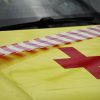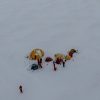
The Olympic summit, held in Lausanne on December 5, did not gave an answer to the main question — when will the decision be announced regarding the participation of Russian and Belarusian athletes in the 2024 Games in Paris. But in the final resolution, the Russian government was suddenly again accused of being involved in organizing a doping program at the 2014 Olympics in Sochi — although the IOC commission had previously stated that there was no evidence of this.
In a year, nothing has come from the IOC. It is worth recalling that the Olympic summit held a year ago was a major step towards the abolition of the IOC’s recommendations on the exclusion of Russian and Belarusian athletes from international competitions, which were formulated as “security measures.” The Olympic Council of Asia then noted that the Russians and Belarusians were definitely not in danger at tournaments in this part of the world and invited them to compete at the Asian Games, where they could qualify to participate in the Olympics in Beijing. In addition, the overwhelming majority of the remaining summit participants spoke in favor of the return of athletes from Russia and Belarus to international tournaments in a neutral status.
The IOC then instructed the executive committee to study this issue, and at the beginning of 2023 it made a new recommendation — to allow athletes from Russia and Belarus to participate in international competitions, but subject to a number of criteria. In particular, the road to the international arena was supposed to be closed to athletes who expressed active support for the Northern Military District, as well as those who were related to the army and security structures. The final decision on the admission of Russians and Belarusians remained with the international federations, which were recommended to create special working groups to study which athletes fit the stated criteria and which do not.
And now exactly one year has come since that Olympic summit. It can be stated that little has changed regarding the performance of our athletes at international tournaments. Most of all, they participate in tennis competitions, as well as in the NHL and a number of European football championships — well, no one deprived them of the right to engage in professional activities and before all this chicanery from the IOC. Some international federations followed the recommendations from Lausanne. Wrestling, judo, taekwondo, fencing are some of the sports where Russians and Belarusians participate in international tournaments, although almost always with an incomplete team.
Boxing stands apart, where athletes from two countries go to tournaments not even in a neutral status, but under their own flag — however, whether this is a coincidence or not, the International Boxing Association under the leadership of Umar Kremlev was deprived by the IOC of full status and the right to host the Olympic tournament. Finally, the ROC was also suspended — formally for accepting membership in the Olympic Councils of the DPR, LPR, Kherson and Zaporozhye regions, despite the fact that seven years ago no sanctions were imposed for similar actions in relation to the regional Olympic organizations of Crimea and Sevastopol.
It can also be stated that the majority of federations — even those where formal decisions on the admission of athletes from Russia and Belarus were made — continue in practice to pursue a policy of maximum obstruction of the implementation of IOC recommendations. In winter sports, ours generally remain “outside the game,” as in many major summer sports — swimming, gymnastics, and track and field. The seemingly good idea of the participation of Russians and Belarusians in the Asian Games turned out to be nothing — the IOC, in fact, vetoed it, explaining it with “technical reasons.” Finally, it is still not clear whether athletes from Russia and Belarus will be allowed to participate in the Olympics in Paris. The IOC says it will make an appropriate decision at the «right moment», periodically hinting that it will be positive. However, qualifications are in full swing, and in many sports the chances of getting to the Games have already been lost for our athletes.
There will be no acceleration? Well, this is precisely the point that the IOC drew attention to at the Olympic summit. «Representatives of international summer sports federations have asked the IOC to grant the right to participate in the 2024 Olympic Games in Paris to those neutral athletes who have qualified or will qualify for the competition. They also asked that a decision on this matter be made as soon as possible in order to clarify the procedure Olympic qualification for all interested athletes,» the final communiqué said. It is reported that this request was supported by the continental NOC associations and the President of the Association of NOCs (ANOC). In a similar vein, the head of the IOC athletes' commission said in a statement that clarity on whether neutral athletes would compete in Paris and under what conditions would be welcomed by athletes as the 2024 Olympics quickly approaches.
< br>To all this, the IOC responded with the following paragraph: “The participation of neutral athletes in the Olympic Games can only take place if the current strict criteria are met. Neither the qualification system developed by the relevant international federations nor the quota can be changed in the interests of athletes with Russian and Belarusian passports. They must meet all eligibility criteria that apply to any Olympian.»
Well, at least on one issue regarding the participation of Russian and Belarusian athletes in the 2024 Games, specifics have appeared. The IOC stated that the same criteria that are prescribed in the current recommendations of the organization’s executive committee on admission to international tournaments will be applied to them. That document stated that they did not apply to the Paris Games — apparently, the possibility of softening these conditions was allowed. Now this line can be officially forgotten — as well as the hopes of seeing the strongest Russian athletes in Paris, representing CSKA, Dynamo and the Russian National Guard.
However, the IOC did not give an answer to the request to speed up the decision. This means that the latest statement by the organization’s president, Thomas Bach, remains in force, in which he fixed March 2024 as the date when it should be officially adopted.
The Friendship Games are so feared that they are not named. Another important part of the Olympic summit resolution concerns the Friendship Games — which the IOC is apparently so afraid of that it does not even name them, but makes do with the wording “politically motivated sports competitions.” It says that the President of ANOC and representatives of continental NOC associations have stated that their organizations will not support the participation of athletes in such events, and the associations of international federations of summer and winter sports have also opposed involvement in them in any role.
But the most interesting thing is in paragraph No. 22, which reports the position of the World Anti-Doping Agency (WADA), which at a recent meeting of the founders already expressed no confidence in the organizers of the Friendship Games in terms of anti-doping support for these competitions and, moreover, threatened “consequences” to all those who will take part in them. It literally says the following: “In addition, such events will be organized by the same Russian government that was involved in the systematic doping program at the 2014 Sochi Olympics and later in the manipulation of anti-doping data.”
And this is interesting because such a statement directly contradicts the official document of the IOC — namely the report of the commission led by Samuel Schmid, which investigated doping violations at the Olympics in Sochi. This report is in the public domain, and on page 24, in the very first conclusions of the commission’s work, the following is stated verbatim: “Russian government officials admitted violations committed by individuals in Russian institutions, but never recognized the “state system of supporting doping.” The IOC Commission I have not found any documentary, independent and impartial evidence confirming the support or awareness of this system by the highest government bodies.»
What happens now — the IOC canceled the conclusions based on the results of the work of its own commission and supported the accusations of Grigory Rodchenkov, which were not confirmed? The organization’s press service, as is usually the case with inconvenient questions, is unlikely to provide clarification, so you can try to play “devil’s advocate” yourself and assume that the IOC will call this wording WADA’s private opinion. But then additional questions will arise, namely: on what basis does WADA consider the conclusions of the IOC commission led by Schmid incorrect and why then did IOC representatives, including Bach, sign the resolution of the Olympic summit — do they not respect the opinion of their own structure?
But All these questions are, of course, rhetorical. The answer to them is very simple: all this fits perfectly into a series of shameless and illegal actions by the IOC in relation to Russian sports. They have long forgotten about the rules in this struggle — in Lausanne they do not disdain outright lies. Just like in the saying “they won’t spare even their father for the sake of a catchphrase.” In this case, by the way, the former president of Switzerland, who is Schmid. “Our colleagues from Lausanne are a little weird,” said ROC President Stanislav Pozdnyakov a few days ago. Well, all that remains is to state that they continue to act weird.
























































Свежие комментарии